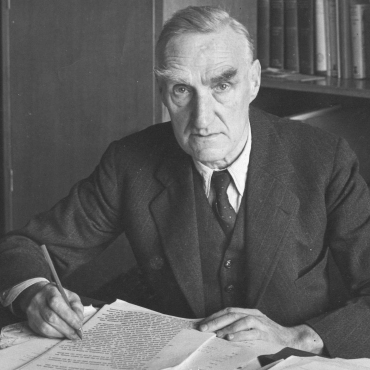
Sir John Boyd Orr, 1st Baron Boyd-Orr CH, DSO, MC, FRS was the first chairman of the Nutrition Society.
At the age of 19 he won a Queen's Scholarship to study at a teacher training college in Glasgow. At the same time he entered a three-year degree course in theology at the University.
He held various teaching posts in Glasgow thereafter but found difficulties teaching the malnourished students. After fulfilling his scholarship teaching requirement he decided to return to studying.
He returned to university, graduating with a BSc in Biology 1910, and M.B. Ch.B. in 1912, at the age of 32. Two years later, in 1914, he graduated M.D. with honours, receiving the Bellahouston Gold Medal for the most distinguished thesis of the year.
After a stint in general practice, he decided his passions lay elsewhere, and he embarked on his research journey, having accepted an offer of a two-year Carnegie research scholarship.
This is where his career as a nutritionist took off, where his research covered malnutrition, protein and creatine metabolism, the effect of water intake on nitrogenous metabolism in humans, and the energy expenditure of military recruits in training.
In 1914, he took charge of a new research institute in Aberdeen, in what is now known as the Rowett Institute.
After spending WW1 in the army as a civilian surgeon, he spent the 1920’s engrossed in his research, which was devoted mainly to animal nutrition, his focus changed to human nutrition both as a researcher and an active lobbyist and propagandist for improving people's diets.
From 1929 to 1944, he was Consultant Director to the Imperial Bureau of Animal Nutrition, later the Commonwealth Bureau of Nutrition (part of the Commonwealth Agricultural Bureau), which was based at the Rowett Research Institute.
After the Second World War, he resigned from the Rowett Institute, and took several posts, most notably as Director-General of the United Nations' new Food and Agriculture Organization (FAO). Although his tenure in this position was short (1945-1948), he worked not only to alleviate the immediate postwar food shortage through the International Emergency Food Committee (IEFC) but also to propose comprehensive plans for improving food production and its equitable distribution--his proposal to create a World Food Board. Although the board failed to get the support of Britain and the US, he had laid a firm foundation for the new U.N. specialized agency.
In 1949 he received the Nobel Peace Prize for his scientific research into nutrition, donating the entire financial award to organizations devoted to world peace and a united world government.
In 1960 he became the co-founder and the first President of the World Academy of Art and Science (WAAS).
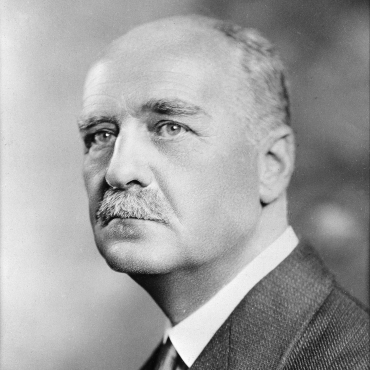
Sir Joseph Barcroft CBE, FRS was Chief Physiologist at the Gas Warfare Centre during both World Wars.
While still a schoolboy he was awarded a BSc in 1891. After opting to study physiology, he entered King’s College Cambridge as an exhibitioner in 1894, he obtained first class honours in natural sciences (BA, 1896), was made a fellow of Kings (1899), won the Walshingham Medal for biological research (1899), and in 1900 shared the Gedge Prize for physiological research with H. H. Dale.
Entering King’s College Cambridge as an exhibitioner in 1894, he obtained first class honours in natural sciences (BA, 1896), was made a fellow of Kings (1899), won the Walshingham Medal for biological research (1899), and in 1900 shared the Gedge Prize for physiological research with H H Dale. Entering King’s College Cambridge as an exhibitioner in 1894, he obtained first class honours in natural sciences (BA, 1896), was made a fellow of Kings (1899), won the Walshingham Medal for biological research (1899), and in 1900 shared the Gedge Prize for physiological research with H H Dale. Entering King’s College Cambridge as an exhibitioner in 1894, he obtained first class honours in natural sciences (BA, 1896), was made a fellow of Kings (1899), won the Walshingham Medal for biological research (1899), and in 1900 shared the Gedge Prize for physiological research with H H Dale. By the outbreak of the Great War he had already achieved international recognition for his work on the respiratory function of blood
By the outbreak of the Great War he had already achieved international recognition for his work on the respiratory function of blood. Aspects in his preferred field which he studied included the effects of temperature, carbon dioxide pressure, acidity, salts, dialysis, diet and exercise and high altitude; for the latter, he participated in high-altitude expeditions, in Tenerife in 1910 and at Monte Rosa, Italy in 1911.
He also invented the Bar-Croft deferential blood gas manometer.
In both the First World War and Second World War he was appointed Chief Physiologist at the Gas Warfare Centre. In the course of his research he was never hesitant to use himself as the test subject, and in 1918 he was appointed a CBE for his services.
In 1919 he returned to Cambridge as reader in physiology, working on the circulation, the distribution of blood, its storage and release by organs such as the spleen, and on the various causes of anoxaemia.
In 1937 he was made chairman of the Food Investigation Board and during the War was chairman of the Nutrition Society.
Numerous honours and responsibilities came his way over the years: In 1910 he was elected a fellow of the Royal Society, president of the physiological section of the British Association in 1920, the Royal Society Medal in 1922, the Fullerton Professor-ship of the Royal Institution in the same year, the chair of physiology at Cambridge in 1925, as well as honorary doctorates from six universities in Europe and North America.
He would also deliver the Croonian Lecture in 1935. He was also knighted in 1935 and elected a Foreign Honorary Member of the American Academy of Arts and Sciences in 1938. In 1943, he was awarded the Royal Society Copley Medal.
In 1937 he was made chairman of the Food Investigation Board and during the War was chairman of the Nutrition Society.
Upon his return to Cambridge in 1941, he was appointed head of the newly formed animal physiology unit of the Agricultural Research Council,
In 1944 the Royal College of Obstetricians and Gynaecologists made him an honorary fellow. Awarded the Copley Medal of The Royal Society in 1943, he was also made Honorary fellow of the Royal Society Edinburgh in 1944.
In 1944 the Royal College of Obstetricians and Gynecologists and the Royal Society of Edinburgh made him an honorary fellow.
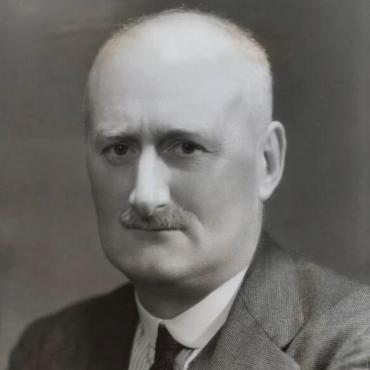
Sir John Hammond CBE, FRS, PhD, was the Head for the School of Physiology of Animal Reproduction of the University of Cambridge.
At Cambridge he took the Natural Sciences Tripos followed by the Diploma at the School of Agriculture in 1911. He started his research career under Dr F. H. A. Marshall and his interest in all aspects of animal reproduction was lifelong.
He joined the School of Agriculture in 1920, having served in the 1914-18 War, and devoted himself to research in a wide range of problems relating to the physiology of farm animals until his retirement in 1954. He became a great authority on breeds of livestock and on their breeding.
Cambridge recognized his distinction by electing him to a Readership in Agricultural Physiology in 1943, while his College - Downing - made him a Fellow in 1936.
He also later headed the School of Physiology of Animal Reproduction of the University of Cambridge and was a founder of the Cambridge Animal Research Station.
He was elected to Fellowship of the Royal Society of London as early as 1933, he received an Honorary Fellowship of the Royal Agricultural Society of England in 1956, an Honorary Associateship of the Royal College of Veterinary Surgeons in 1959, and he was made a Knight Bachelor in 1960. He held honorary degrees from Leeds, Durham, Iowa, Copenhagen, Cracow, Louvain and Vienna Universities and was a foreign member of a number of agricultural and veterinary academies and societies outside this country.
It was inevitable also that he should serve on a number of important government committees and commissions with particular reference to animal production, and his services were enlisted by the UN Relief and Rehabilitation Administration (U.N.R.R.A), the UN and the FAO, as well as by scientific councils and bodies globally. He had been president of the British Society of Animal Production, the Nutrition Society, the 2nd International Congress of Physiology and Pathology of Animal Reproduction and Artificial Insemination, and Section M (Agriculture) of the British Association.

Robert Campbell Garry OBE, MB, ChB, D.Sc., HonLLD, FRCPG was a former Professor of Physiology at the University of Glasgow.
He enrolled at 16 as a medical student at the University of Glasgow in 1917, during the First World War where medical expertise was greatly required. He graduated MB, ChB with Honours in 1922, also receiving the Brunton Memorial Prize for the most distinguished student of his year. His first stint as a physiologist was as an Assistant in the Institute of Physiology at the University of Glasgow. He was then promoted to a lectureship and he spent a sabbatical year at Freiburg in Germany, before being appointed Head of Physiology at the Rowett Research Institute in Aberdeen in 1933.
During this time he worked closely with the Director, John Boyd Orr in a very close partnership.
In 1935 he was invited by the Principal of the University of St Andrews, to take up the Chair of Physiology in University College, Dundee. ln 1947, he was invited back to his alma mater the University of Glasgow where he worked as Professor of Physiology until 1970.
He had a wide involvement in public service, in relation to the funding of research through the Medical Research Council and the Scottish Advisory Committee for Medical Research (now the Clinical and Biomedical Research Committee of the Chief Scientist's Office at SHHD).
He was a valued adviser to the Ministry of Defence in human adaptation to adverse environmental conditions, significantly contributing to the Flying Personnel Committee as a member, and later its chairman.
He served on the governing bodies of many important biological organisations, such as the Hannah Dairy Research Institute, the Hill Farming Research Organisation, the Glasgow College of Domestic Science and the Board of Management of Glasgow Western Hospitals. During this period he served also as editor of the Journal of Physiology.
His own personal research was in the field of autonomic control of the alimentary tract.
For his contributions, he has been recognised publically in many ways. He was given a D.Sc. by the University of Glasgow; he was elected a Fellow of the Royal Society of Edinburgh in 1937, and of the Royal College of Physicians and Surgeons of Glasgow. He was also invested as an Officer of the Order of the British Empire (OBE).

Dr Leslie J. Harris Sc.D., DSc, PhD, FRIC was a former director of the Dunn Nutritional Laboratory and one of the Nutrition Society’s founding members.
Having graduated in Science at the University of Manchester, he moved on to biochemistry research under Sir Frederick Gowland Hopkins, where his research was centered mainly on amino acids, polypeptides and protein structure.
In 1925 he was awarded the Medola Medal by the Royal Institute of Chemistry for his work.
In 1926 he was chosen by the MRC to be director of the Dunn Nutritional Laboratory in Cambridge. His research now focused mainly on the effects of excess vitamins A, D and a deficiency in B1.
During WW2, his research moved onto assessing vitamin content of dehydrated foods, which was of vital importance to the nation in a time of rationing.
In 1942 Leslie was made Honorary Secretary of the Nutrition Society. He later went on to become its president in 1953. Amongst his other responsibilities, in 1946 he was responsible for initiation & organisation of the first International Congress of Nutrition held in Cambridge.
This led to the formation of the International Union of Nutritional Sciences and was its first secretary general.
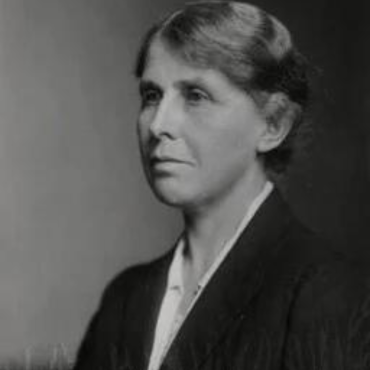
Dr Dame Harriette Chick DBE, PhD, FRSM was Head of the Division of Nutrition at the Lister Institute.
She was raised in a time where women’s participation in the sciences was generally frowned upon. Nonetheless she took it in her stride, and in 1894 enrolled as a science student at University College London. After graduation, she stayed on to gain a doctorate in bacteriology, working part of the time in Vienna and in Munich where she became familiar with spoken German.
In 1905, she became the first woman to obtain a position at the Lister Institute of Preventive Medicine in London. This was the only medical research institute in Britain at that time and had been established in 1891 as a private charity.
In her role of Assistant she worked directly with Charles Martin in his laboratory. Her first assignment was to develop better methods for measuring the relative biological potency of different disinfectants, about which there had been considerable confusion. Next her research involved investigating whether “inactivation” of microorganisms could be explained in terms of the denaturation of their proteins. She then worked with Martin on a project related to his studies on the recent outbreaks of bubonic plague in India.
With the outbreak of World War I in August 1914, the whole staff volunteered its services to the Army Medical Department. In 1916, Martin was in the Middle East working at a military hospital and saw cases of both scurvy and beriberi that he believed resulted from the restricted range of foodstuffs in the army rations. The following research concluded that for the prevention of beriberi, good additions to army rations would be whole-grain cereals, pulses, dried eggs, and yeast, but not milk or cheese. For the prevention of scurvy, where fresh vegetables and fruits were not available, they recommended fresh meat and freshly germinated pulses. She also was the first to discover that the highest content of thiamine was present in the branny layers of rice grain, and that its processing was responsible for diminishing the vitamin content of rice and subsequently the diet, leading to beriberi.
She is also best remembered for demonstrating the roles of cod liver oil and sunlight in preventing rickets (Vitamin D deficency associated) in the Vienna program.
She held many positions of responsibility over the years. In 1918 she was elected to the Physiological Society. She served as Secretary of the Accessory Food Factors Committee of the Medical Research Council from 1918–1945. She was appointed CBE in 1932 and subsequently DBE in 1949. She also served as secretary of the League of Nations health section committee on the physiological bases of nutrition from 1934 to 1937. She was also a founding member of the Nutrition Society.

Alfred L. Bacharach, M. A., F. R.I. C was one of the founding members of The Nutrition Society.
Having graduated from Clare College, Cambridge in 1913 with an MA in natural sciences, he went on to work as a Food scientist at the Wellcome Chemical Research Laboratories Analytical department in 1915, where he prepared antiseptic cresols, local anesthetics and salicylic acid.
In 1920 he was persuaded to join Glaxo. He began as an analytical chemist but soon moved to the field of vitamin assays. Bacharach and Harry Jephcott discovered that their dried milk was deficient in fat-soluble vitamins, performing studies in animals after the firm was granted a Home Office license. Bacharach was a member of the Society of Public Analysts from 1919 and presented data on vitamins at several of their meetings. Bacharach brought much to Glaxo including statistical analysis of biological results and colorimetric assays utilizing new ultraviolet spectrophotometers. He was actively passionate about education, serving as a governor of the Borough Polytechnic and of Kynaston School.
During the war he was one of the founders of The Nutrition Society and its Honorary Treasurer for 10 years, later going on to serve as President.
In 1949 has was appointed to the staff of the Public Relations Director at Glaxo. He held many responsibilities and was an active member of many scientific societies over the years, including; chairman of the Food Group of Society of Chemical Industry, vice president of the Royal Institute of Chemistry and Society of Chemical Industry and on the publication committee of the Society of Analytic Chemistry. He was also chairman of the Biological Methods group. Moreover, he was co-editor of many books and publications.

Sir David Paton Cuthbertson CBE, BSc, MB, ChB, LLD, Dhc, FRSE, was a former director of the Rowett Research Institute,
After army service he graduated from Glasgow University with chemistry as the principal subject. He won the Dobie-Smith gold medal and was awarded a scholarship by the Scottish board of agriculture to undertake research in chemistry. He decided, however, that his interest in research required a medical degree and he graduated MB, ChB from the University of Glasgow, having obtained the Hunter medal in physiology and the Strang-Steel scholarship for research, which enabled him to carry out the work during vacations for his first scientific publication, in the Biochemical Journal in 1925.
His research interests at this time included studies on the interactions of carbohydrate and fat with the metabolism of protein, some of which were carried out in collaboration with colleagues, of whom one, Hamish N. Munro, was to gain a considerable international reputation for his work in nutrition about thirty years later. In 1937 he was awarded his MD with honours and received the Bellahouston medal of the University of Glasgow. Undoubtedly, however, it was the publication of his Arris and Gale lecture of the Royal College of Surgeons of England in The Lancet (1942, 1, 433–7), entitled ‘Post-shock metabolic response’, which gained for him his greatest and enduring international recognition. Textbooks throughout the world came to refer to his general classification of the changes in metabolism which follow serious injury as the ‘ebb’ and ‘flow’ phases, the ebb phase corresponding to the period of clinical shock, and the flow phase to the subsequent period of increased energy consumption, which gradually returns towards normal with healing and recovery.
During the later years of the Second World War business travel (to research or scientific committee meetings) became part of his life and continued until his death. His secondment to the Medical Research Council (MRC) in London in 1943 required frequent travel between Glasgow and London until 1945. In that year he became director of the Rowett Research Institute, Aberdeen, a post which he held until his retirement in 1965 with a knighthood; having already been appointed CBE in 1957. Under his direction the institute expanded with new buildings and facilities, such that in 1951 there were nine sections, and in its jubilee year in 1963 the number of staff had increased fourfold. There were laboratories for studies with trace elements, radioactive isotopes, and a large animal calorimeter. The Rowett thus became an internationally renowned in nutritional research facility.
On retirement he returned to full-time research on the changes in metabolism following injury, with support from the MRC and Glasgow Royal Infirmary. He continued to publish scientific papers and review articles, and travel widely to scientific meetings, being particularly welcome in the USA. Two of his notable attributes were his ability to obtain support for research and to encourage others.
His eminence was recognized by honorary degrees from Rutgers, Glasgow, and Aberdeen. He served as the Royal Society of Edinburgh’s vice-president, as well as elected a fellow. The Nutrition Society’s annual Sir David Cuthbertson Medal is named after him and is awarded to scientists or clinicians at an early stage of their career for excellence in clinical nutrition and/or metabolism research providing an evidence base for clinical practice.
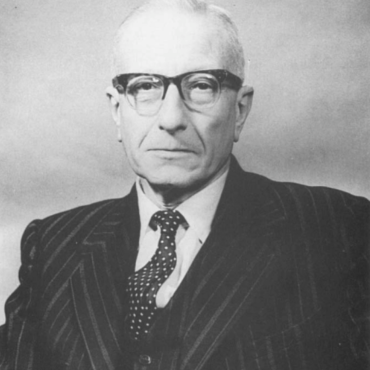
Professor Stanislas Kon PhD, D.Sc. FRIC was a Professor Emeritus and a Deputy Director at the National Institute for Research in Dairying.
He obtained his degree in Chemistry in 1923 from the University of Warsaw. Not being content on residing in one place, he travelled across the USA and England, working in various labs, such as those of Hopkins in Cambridge, and Drummond in London. His research interests included vitamins, food protein structure and hormone discovery. He then accepted a post at the National Institute of Research in Dairying to study the nutritive value of milk.
In 1936 he was awarded the degree of D.Sc. at the University of Reading, and in 1942 was elected a fellow of the Institute of Chemistry. In 1945 he became Head of Nutrition after a departmental reorganization of the Department of Physiology and Biochemistry.
During this time he developed chemical assays for riboflavin, vitamin A and thiamine through his work on factors affecting milk nutrients. He also investigated cow breed, diet and heat treatments to determine their effects on milk. Later on his investigations led on to looking at calcium balance in rats and the biological value of proteins.
During WW2 his work involved studying the vitamin content of dairy products, as well as the national loaf and emergency rations. He was also a collaborator with the MRC to ascertain vitamin A requirements in humans, establishing that B-Carotene conversion to vitamin A takes place in the intestinal tract. This research led to him being appointed deputy director of the National Institute of Research in Dairying in 1959. In 1964 he became a research professor at the University of Reading, as well as appointed a CBE. In his native land of Poland, he was elected as a member of the Polish Academy of Sciences in 1969, and made a fellow of the American Institute of Nutrition.
He recognised the need to bring together human and animal nutritionists to share their knowledge, resulting in the Nutrition Society formation in 1941. He was also the first editor of the British Journal of Nutrition, and remained so until 1965. In 1969 he was made an Honorary fellow of The Nutrition society.

Dr. James Andrew Buchan Smith, B.Sc., PH.D. C.B.E., PH.D., D.SC, F.R.I.C, FRSE was the Director of the National Institute for Research in Dairying.
He graduated with a B.Sc. in Chemistry from the University of Birmingham. In 1929 he undertook his PhD on the chemical determination of rare sugar lyxose. After stints of post-doctoral fellowships at University College and Imperial College’s in London, appointed a lecturer in the new subject of biochemistry at Liverpool University in 1932.
In 1936 he was appointed a post in biochemistry at the Hannah Dairy Research Institute. His work initially was concerned with the secretion of milk fat by the cow but the advent of war and the shortage of protein concentrates for farm animals turned it to a quantitative examination of the use of non-protein nitrogen, in the form of urea, by rumen microflora.
In 1946, he left the Institute to return to academic life in the Biochemistry Department of Glasgow University, but the secondment of Dr Norman Wright, the Director of the Institute, to the Ministry of Food in 1947 led the Council of the Institute to invite him to return as Deputy Director, and in 1950 was appointed Director.
In recognition of his success as Director and his services to agricultural science he was appointed a CBE in 1959.
In addition to his duties as Director, he has given very fully of his time and knowledge to a wide variety of academic, trade and Government committees and, not least, to scientific literature. His editorial work for Nutrition Abstracts and Reviews, and the Journal of Dairy Research and refereeing for other journals over a long period has been invaluable and greatly enhanced the quality of these journals.
After 33 years work at the Hannah Dairy Research Institute he retired in December 1970.
He was a past President of the Society of Dairy Technology. For many years he had taken an active part in the affairs of the International Dairy Federation and his careful and well-balanced contributions to that body have recently been rewarded by being made Chairman of the important commission dealing with Standards and Analytical Techniques.
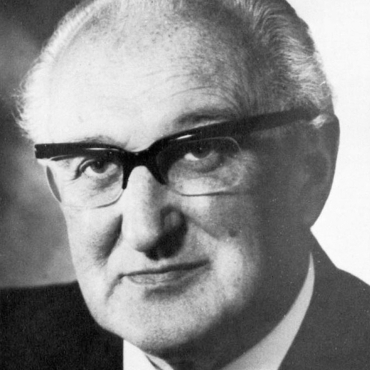
Professor Egon H. Kodicek CBE, FRS, MD, PhD, was the Director of the Dunn Nutritional Laboratory at the MRC.
He graduated from Charles University in Prague with an MD in 1932 and spent the next 7 years combining the practice of medicine with research on vitamins and hormones at the University’s Department of Internal Medicine. His early career studies were recognised for their imaginative originality and as such was awarded the Masaryk Fund Prize of the Czechoslovak National Research Council.
Fortunately for him, his reputation had reached Britain before the outbreak of WW2. Along with other European Jewish scientists he was offered sanctuary in Britain as the Nazi invasion spread throughout Czechoslovakia. He arrived in Cambridge in 1939 and began work at the Dunn Nutritional laboratory. In 1942 he was appointed to the Scientific Staff of the MRC, and a permanent member in 1947. It was in the Dunn that he established his mark on nutritional science and developed his distinctive research style.
It was vitamins that captured his interest, devising methods of detecting and measuring their concentration in tissues, taking up most of his time during his first 10 years at the Dunn. In 1963 he was offered the role of Director at the Dunn Nutritional Laboratory. It was from here that the objectives of the laboratory expanded in outlook, securing new equipment allowing research in the fields of chemistry, biochemistry, microbiology and experimental pathology in the laboratory.
Some of the most notable research that occurred under his belt were the discovery of vitamin D metabolism.
He was elected a fellow of the Royal Society in 1973. He was awarded the British Nutrition Foundation Prize in 1973 and the Ciba Medal of the Biochemical Society in 1974.

Professor Sir Kenneth Blaxter PhD, FRS, PRSE was a former director of the Rowett Research Institute.
After graduating, he worked at the National Institute for Research in Dairying (NIRD). With the onset of World War II, he was conscripted and served with the 10th Field Regiment of the Royal Artillery from spring 1940 to the end of 1941, when he returned to NIRD. He completed his PhD thesis, entitled ‘The maintenance of the winter milk supply in wartime’; in 1944. Shortly thereafter, he requested to be seconded to the biochemistry department of the Ministry of Agriculture in Weybridge, where he conducted blood analysis and researched lead toxicity in ruminants. In 1946, he moved to Illinois to work with animal nutritionist Harold Mitchell at the University of Illinois.
In 1947, after returning to England, he applied for the headship of the Nutrition Department at the Hannah Dairy Research Institute in Ayr, Scotland and received the position in 1948. During his tenure at the Hannah Dairy Research Institute, he wrote over 200 papers, focusing primarily on the issues of energy metabolism and feed usage by ruminants. He also investigated nutritional diseases and magnesium deficiency in calves, the effect of temperature and other environmental effects on sheep, and ruminant digestion and feed intake.
In 1965, he was appointed director of the Rowett Research Institute in Aberdeen, Scotland. There, he and his team of researchers studied topics of importance to the Scottish farmer, including deer farming, llamas, human nutrition, feed evaluation, environmental stress and animal calorimetry.
He was named a Fellow of the Royal Society in 1967 and was knighted in 1977. From 1972 to 1975, he served as vice-president of the Royal Society of Edinburgh, and acted as its president from 1979 to 1982. In 1979, he received the Wolf Prize in Agriculture for his research into the nutritional requirements of ruminants, and the Rank Prize in Nutrition for his lifetime contributions to nutrition science.
He was also the recipient of honorary doctorates from Queen's University in Belfast, the Agricultural University in Norway, the University of Leeds, the University of Aberdeen and the University of Newcastle.
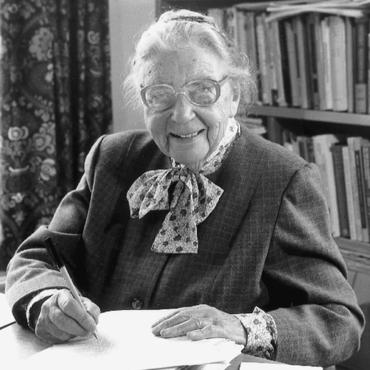
Dr Elsie Widdowson BSc, PhD, CH, CBE, FRS was Head of Infant Nutrition Research at the Dunn Nutrition laboratory.
She studied chemistry at Imperial College, London and graduated with a BSc in 1928, becoming one of the first women graduates of Imperial College. She completed postgraduate work at the Department of Plant Physiology at Imperial College, receiving a PhD in chemistry in 1931 for her thesis on the carbohydrate content of apples. She did further research with Professor Charles Dodds at the Courtauld Institute of Biochemistry at Middlesex Hospital, on the metabolism of the kidneys, and also received a doctorate from the Courtauld Institute.
In 1934 she and Dr Robert McCance began working on the composition of various food items as the American tables carbohydrate content being used at the time were calculated by difference. They were co-authors of The Chemical Composition of Foods, first published in 1940 by the Medical Research Council. It is now regarded as the foremost nutrition publication and is the basis of most nutritional databases around the world.
She and McCance also headed the first mandated addition of vitamins and mineral to food. Their work began in the early 1940s, when calcium was added to bread. They were also responsible for formulating the wartime rationing of Britain during World War II.
She later became Head of Infant Nutrition Research at the Dunn Nutrition laboratory where she analyzed infant milks sold throughout Europe. After retiring in 1973 she moved to the Department of Investigative Medicine at Addenbrooke’s Hospital in Cambridge where she held laboratory accommodation, PhD students and an office, which she maintained until 1988 when she retired for the second time.
She became president of the Neonatal Society from 1978, and president of the British Nutrition Foundation from 1986 to 1996. In 1979 her work had earned her a CBE.
She became a Fellow of Imperial College in 1994. She received numerous awards for her work including the Nutricia International Award, the James Spence medal and the Atwater award.

Professor Ian Macdonald was Professor of Physiology at the Medical School, Guy’s Hospital in London. He studied medicine and specialised in Obstetrics before becoming interested in nutrition research. For his PhD he studied the growth and hardness of the human fetal head and how it may hinder labour in post-maturity. He went on to postulate a hormonal cause of pregnancy morning-sickness. He then went on to study the effect of dietary carbohydrate intake on lipid metabolism, for which he was awarded a DSc by the University of London in 1966.
Professor Macdonald then took up the post of Head of the Physiology Department in the medical school of Guy’s Hospital and served on many expert committees such as the Food Advisory Committee of MAFF, and became chairman of the British Nutrition Foundation. He served as Secretary to the Federation of European Nutrition Societies and Chairman of a Joint WHO/FAO Expert Committee on Dietary Carbohydrates.
Profession Macdonald served as Programmes Secretary of the Nutrition Society and was proud to be appointed as President of the Society from 1980-1983 where his clinical background prompted him to encourage the Society to hold joint meetings with clinical groups.
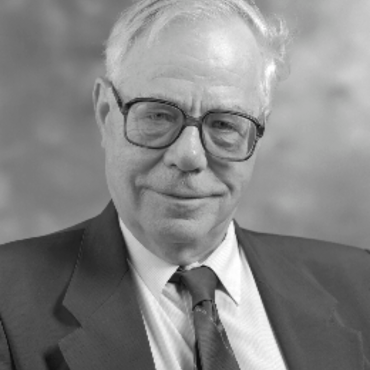
Professor John Conrad Waterlow BSc, MBBS, FRS was a Professor of Human Nutrition at the London School of Hygiene and Tropical Medicine.
His research interests included protein turnover and protein-energy malnutrition. His early career included a 1945 trip Caribbean to investigate why large numbers of children there were dying, and discovered that many had oedematous malnutrition and fatty livers. He subsequently discovered that the syndrome he was observing was the same as Kwashiorkor which had been described a few years earlier in Africa. He set about investigating the biochemical basis of Kwashiorkor, both in the West Indies and at several field stations in Africa. In 1947 he became the founding editor of the European Journal of Clinical Nutrition.
In 1970 he became Professor of Human Nutrition at the London School of Hygiene and Tropical Medicine upon his return to England. He revamped the School's research thrust and expanded its training mission, establishing the Clinical Nutrition and Metabolism Unit.
In 1982 he was elected as a fellow by the Royal Society, as well as appointed chair of the MRC’s Army Personal Research Committee.
He was also appointed advisor on nutrition for the Department for Health and Social Security and Consultant on Nutrition for the Ministry of Overseas Development.

Professor David Armstrong BSc, MSc, PhD, DSc, FRIC, FRSB, FAfN was a Professor in Agricultural Chemistry at the University of Newcastle.
In 1963 he was appointed Head of the Department of Agricultural Biochemistry University of Newcastle. From then until his retirement in 1991, he established his Department in Newcastle as one of the leading centre’s for ruminant nutrition research within Europe and created for himself an international reputation in animal nutrition
In 1968 he was awarded the British Society of Animal Science’s Sir John Hammond Memorial Prize. Later, he was elected as a Fellow of the Royal Institute of Chemistry, and a Fellow of the Institute of Biology (now Royal Society of Biology).
David has received numerous prizes for his research in animal nutrition and the agricultural industry. In 1990 he was awarded the National Dairy Science Award by the American Dairy Science Association
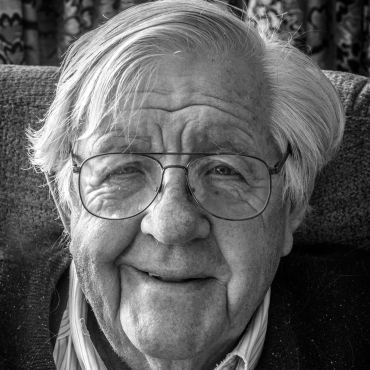
Professor Roger Whitehead PhD, FRSB, FRCP, FRCPCH, FAfN, CBE was Director of the MRC Dunn Nutrition Unit at Cambridge and Keneba, The Gambia, from 1973 to 1998.
Prior to that he was Director of the MRC Child Nutrition Unit in Uganda from 1968 to 1973. He is also a Fellow and a past Vice-Master of Darwin College, Cambridge. He is a past Chairman of Council of the British Nutrition Foundation. He has had close academic links with a number of nutrition departments in British universities as well as in Uganda and China.
His personal area of research was Maternal and Child Nutrition, especially in the developing world covering of states of malnutrition such as kwashiorkor and marasmus as well as the relationship between diet and healthy pregnancy and lactation outcomes.
As a member of the Department of Health Committee on Medical Aspects of Food Policy, he chaired the panel which produced the Report on Dietary Reference Values for Food Energy and Nutrients for the United Kingdom, published in 1991. He has also served as an advisor on various WHO, FAO and UNU committees.
Although not medically qualified, he is an Honorary Fellow of the Royal College of Physicians and an Honorary Fellow of the Royal College of Paediatrics and Child Health. Since 1973, he has been a Fellow of the Institute of Biology (now FRSB) and from 1998 a Fellow of the International Union of Nutritional Sciences (IUNS). In 1992, he was appointed a CBE.
In retirement his main academic links have been back in Uganda at the School of Food Technology, Nutrition and Bioengineering at Makerere University, where he helped to set up a Master’s degree course in Applied Human Nutrition.
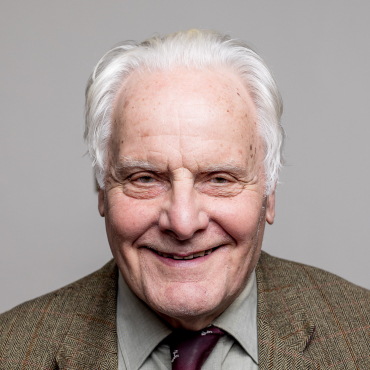
John Webster MA, VetMB, PhD, MRCVS, FNS,FAfN
John Webster, trained as a vet, began a research career with Sir Kenneth Blaxter (KB) at the Hannah Research Institute, Ayr, studying the impact of cold stress on energy metabolism in ruminants. This led him to the University of Alberta, Canada, where it was really cold, but he was allowed to teach cowboys. However, KB persuaded him to return to the Rowett Institute, Aberdeen where his interests ranged from ruminant digestion to appetite control and the energetics of protein and fat deposition in the rat.
In 1977 he was appointed to the Chair of Animal Husbandry at the University of Bristol, where he established a unit for the study of animal behaviour and welfare, which has achieved international acclaim. He was a founder member of the U.K. Farm Animal Welfare Council and first propounded the ‘Five Freedoms’ which have gained international recognition as standards for defining the elements of good welfare in domestic animals. He is a past president of the Nutrition Society and British Society for Animal Science.
He became Emeritus (i.e. unpaid) Professor in 2005 and has since sought to contribute mostly through writing. Recent books include Management and Welfare of Farm Animals (editor), Understanding the Dairy Cow, Animal Husbandry Regained and, in the Animal Welfare series, Limping towards Eden, and Understanding Sentient Minds and why it matters.
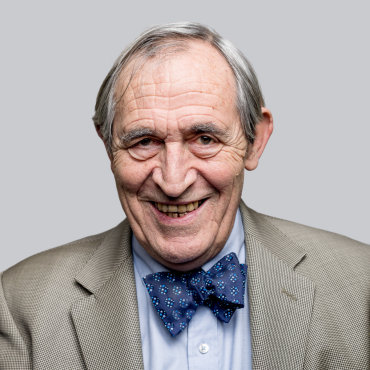
Professor Michael Gibney BAgrSc, MAgrSc, PhD is Professor Emeritus of Food and Health at University College Dublin.
Having graduated from University College Dublin with a MAgrSc in 1971 working on lipid metabolism in lambs, he took up a teaching fellowship at the University of Sydney's Veterinary School in Australia. There he was awarded a PhD in 1976 for work on the digestive physiology of the neonatal lamb.
He then moved to human nutrition with a lectureship at the University of Southampton Medical School in 1977. He then returned to Dublin to take up a post at Trinity College Dublin in the Department of Clinical Medicine as professor of nutrition. During that time he served as Dean (Vice President) of Research. Twenty three years later in 2006, he found himself at UCD taking up the post of Professor of Food and Health. He has also served on the EU Scientific Committee for Food and chaired the working group on nutrition. He has served on several EU and UN committees on nutrition and Health. He has been appointed to the Scientific Advisory Board of the European Joint Programme Initiative on Food and Health Research as well as Board of Directors of the Food Safety Authority of Ireland.
His research interests include public health nutrition and lipids and metabolic syndrome.
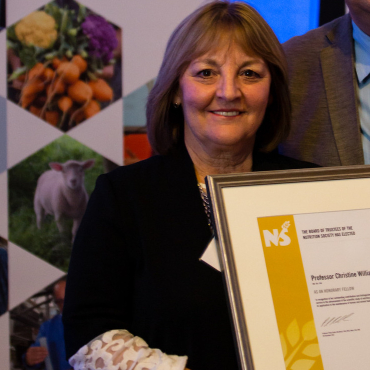
Professor Christine Williams BSc, PhD, FAfN, FRSB, FIUNS, OBE is a Professor of Human Nutrition at the University of Reading.
Her research is revolves around understanding the impact of dietary fats on human health, particularly in relation to cardiovascular disease and insulin resistance. She also has particular interest in enhancing population health through food chain approaches to nutrition from agriculture, manufacturing and food innovation, marketing and communication.
She is frequently involved in providing advice to government and industry on matters relating to dietary policy and actively engages in dissemination of nutritional science to the public.
She is member of a number of expert and advisory committees. In the UK she is a Member of the Governing Body of the British Nutrition Foundation, has chaired the BBSRC Agri-Food Committee, sits on the BBSRC Appointments Board and was a member the Scientific Advisory Committee on Nutrition’s (SACN) working group on saturated fats.
She was awarded the Royal Society of Medicine’s Gold Medal in Nutrition in 1999, and awarded an OBE in the Queen’s Honor’s list in 2013 for her contribution to Higher Education and nutritional sciences.
She has received various honours, and is an elected Fellow of the Society of Biology, the Association for Nutrition and the International Union of Nutritional Sciences respectively.
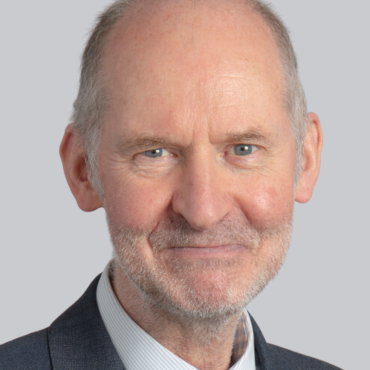
President from 2001 to 2004
Professor Mathers is Professor of Human Nutrition, Director of the Human Nutrition Research Centre and Director of the Centre for Healthier Lives in Newcastle University. He was an undergraduate in Newcastle and undertook his PhD and post-doctoral research in the University of Cambridge followed by a Research Fellow post in Edinburgh University before being appointed in Newcastle. His major research interests are in understanding how eating patterns influence risks of age-related diseases including heart disease, diabetes, dementia and bowel cancer. He uses genomic and epigenomics approaches to understand the mechanisms though which nutrition influences cell function and, ultimately, health.
Professor Mathers has a long-term interest in developing and implementing large scale human intervention studies to improve healthy ageing (The LIVEWELL Programme), and to reduce the risk common age-related diseases including bowel cancer (The CAPP Studies) and dementia (MedEx-UK). He led the EU-funded Food4Me intervention study which used a web-based approach to deliver a personalised nutrition intervention across 7 European countries.
Among his external roles, Professor Mathers was President of the Nutrition Society and served on numerous grants panels and other committees for the MRC, BBSRC, ESRC, World Cancer Research Fund and other research funders. He is a Trustee of the British Nutrition Foundation and of the Rank Prize Funds. Professor Mathers is Editor-in-Chief of the British Journal of Nutrition.
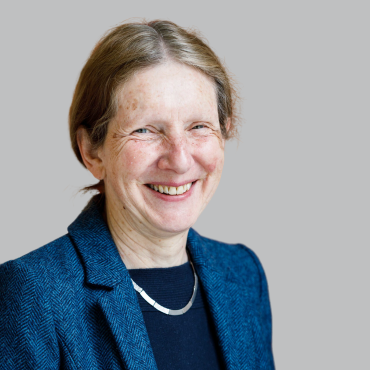
Professor Ann Prentice is an Honorary Senior Visiting Fellow of the MRC Epidemiology Unit at the University of Cambridge MRC Epidemiology Unit. She is the former Director of the MRC Elsie Widdowson Laboratory (previously MRC Human Nutrition Research), Cambridge, and was Programme Leader of the MRC Nutrition and Bone Health Research Group, Cambridge, and Head of the Calcium, Vitamin D and Bone Health research team at MRC Unit The Gambia.
Ann is a research scientist with a strong commitment to the translation of scientific evidence into policy and practice. She was Chair of the UK Scientific Advisory Committee on Nutrition 2010-20 and holds, or has held, other official positions and memberships of Government Committees, Royal Colleges and International Agencies; Research Councils and Universities; Learned Societies and Research Charities.
Her research is focused on lifecourse nutritional requirements for population health, with an emphasis on calcium and vitamin D, and encompasses the nutritional problems of both affluent and resource-limited societies. She has been involved in projects studying pregnant and lactating women, children, adolescents and older persons in the UK, The Gambia, Uganda, Malawi, Kenya, China, Bangladesh, India and South Africa. She has published >350 peer-reviewed articles, plus contributions to book chapters and government reports, the latter most notably in relation to her close involvement with the National Diet and Nutrition Survey since 1992.
In addition to the University of Cambridge, Ann has honorary and visiting appointments at the MRC Unit The Gambia at the London School of Hygiene and Tropical Medicine, the MRC Laboratory of Molecular Biology in Cambridge, the University of Witwatersrandin South Africa, and Shenyang Medical College in China, and she was the Honorary Professor of Global Nutrition and Health at the University of Cambridge from 2017-19. She was awarded an Honorary Doctorate of the University of Surrey in 2014 and was appointed OBE in the Birthday Honours List in 2006.
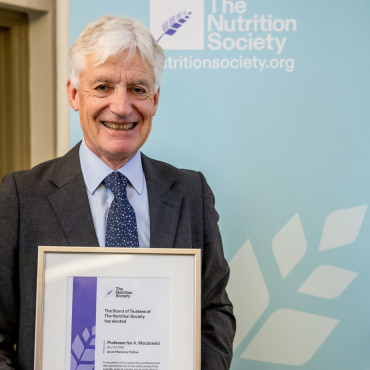
Ian Macdonald is Professor Emeritus in Metabolic Physiology at the University of Nottingham, UK. He obtained a BSc in Physiology & Chemistry in 1973 and a PhD in Physiology (supervised by Mike Stock) in 1977, both from Queen Elizabeth College, University of London. He was an academic member of staff in Nottingham between 1977 and 2020, and Professor of Metabolic Physiology from 1991 to 2020. During his time at Nottingham he was Head of the School of Biomedical Sciences (1997-2002) and of the School of Life Sciences (2013-2017), as well as being Director of Research in the Faculty of Medicine and Health Sciences (2006-2013). He has served on external advisory boards and committees for Health Charities, EU, UK Government, Research Councils in the UK and other European countries. This included being a member of the UK Scientific Advisory Committee on Nutrition (Department of Health and Social Care) from 2007-2020, where he chaired the sub-committee which produced the Carbohydrates and Health Report in 2015. He has published over 410 peer-reviewed original research papers, together with reviews, book chapters and invited contributions. He was President of the UK Nutrition Society from 2007-2010, was Treasurer of FENS from 2011 to 2019, and of the World Obesity Federation from 2009 to 2019. He was joint Editor of the International Journal of Obesity from 2000 to 2021, and is a Fellow of the Royal Society of Biology, a Registered Nutritionist and an Honorary Fellow of the Association for Nutrition, a Fellow of the Physiological Society, and a Fellow of the International Union of Nutritional Sciences. He was awarded the BNF Prize in 2017.
His research has focused on the functional consequences of metabolic and nutritional disturbances in health and disease, with specific interests in obesity, diabetes, cardiovascular disease and exercise, predominantly in healthy individuals and patients. The research has involved collaborations with clinical Academic colleagues and NHS clinicians, both within Nottingham and elsewhere. This work has been funded by grants from Research Councils, Medical Charities, EU (FP5 and FP7), as well as the Pharmaceutical and Food Industries. The research has involved supervision of over 50 non-clinical and clinical researchers studying for PhD or MD/PhD degrees.
A major feature of his research has been the study of multiple body systems to evaluate whole body responses. The early work involved assessing the physiological consequences (mainly on thermoregulation and BP regulation) of metabolic and nutritional disturbances such as starvation, undernutrition, hypoglycaemia and prolonged exercise. More recent work has focussed on the metabolic aspects of diabetes and obesity, including the effects of diet composition and weight loss, and the impact of dietary supplements on carbohydrate and lipid metabolism, and of the effects of surgical trauma and of immobilisation on insulin sensitivity and whole body metabolism.
Two major areas of current interest relate to the use of MR imaging and spectroscopy for assessing alterations in metabolism and the influence of nutrients and metabolic disturbances on gene expression in adipose tissue and muscle. Current work in these areas relates to physical activity and inactivity (including immobilisation), obesity and diabetes.
After retiring from the University of Nottingham in 2020, he was appointed as the Scientific Director of the Nestle Institute of Health Sciences in Lausanne, Switzerland, and after retiring from that post in 2022 he became and external member of the Nestle Research Scientific Advisory Board and the Science and Technology Advisory Council.
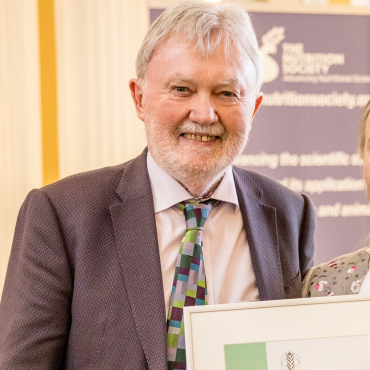
After graduating with a BSc (Chemistry), BAgr (Agricultural Chemistry) and PhD (Nutrition Biochemistry), from Queen’s University, Belfast, he spent several years (1977-1980) in academia in Australia before joining his current institution in 1981. He was appointed to Professor of Human Nutrition in 1994 and was Director of the Northern Ireland Centre for Food & Health (NICHE) from 2006-2015. He has attracted over £35M in research grants and is an author of over 250 peer-reviewed research publications. In 2002, he was elected a member of the Royal Irish Academy and was the 23rd President of the Nutrition Society (2010-2013). In 2014, Professor Strain was appointed Order of the British Empire for services to nutrition research and education. Other prizes include the British Nutrition Foundation Prize 2012 and the William Evans Fellowship, University of Otago, New Zealand. He was President of the Board of the European Nutrition Leadership Programme, Luxembourg (2010-2015), Vice-Chairman, Panel on Dietetic Products, Nutrition and Allergies (NDA), and Chairman, of the NDA Working Group on Claims, European Food Safety Authority (EFSA) Parma (2006-2015). He chairs the International Science Advisory Panel for the New Zealand Government funded, High Value Nutrition Programme.
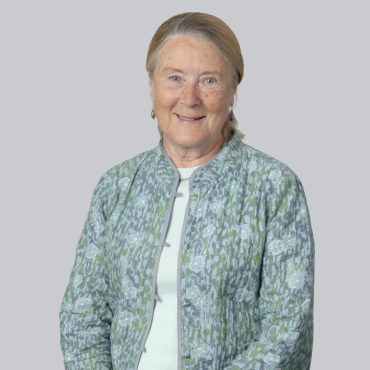
Professor Catherine Geissler was appointed Head of Department of Nutrition and Dietetics, King’s College London, in 1990-5 and Professor of Nutrition and Head of the Division of Health Sciences in 1994., She was made Emerita Professor of Human Nutrition in 2005. Professor Geissler served as director of the Higher Education Academy Subject Centre for Health Sciences and Practice 2000-2011. Prior to appointment as lecturer at King's College (pre-merger Queen Elizabeth College) Professor Geissler graduated BDS in Dental Surgery in Edinburgh and MS & PhD Human Nutrition in Berkeley, California and worked in San Francisco, Teheran, and Paris. She has served on many professional committees including Ministry of Agriculture, Food and Fisheries (MAFF) Food Advisory Committee, World Cancer Research Fund grants committee, and British and American Nutrition Societies. Professor Geissler’s appointment as President of the British Nutrition Society came to an end in August 2016. She was elected Secretary General of IUNS (2013-2017; 2017-2022). Outside of academia, Professor Geissler is a consultant to the food industry and to international development agencies including the World Bank, CGIAR, FAO, which involved work in Iran, Haiti, Mauritius, Sierra Leone, Niger, Benin, Senegal, Ghana, Ethiopia, Yemen, Thailand, Philippines, Singapore, Indonesia, Malaysia and China.

Professor Philip Calder BSc(Hons), PhD, DPhil, RNutr, FSB, FAfN is Professor of Nutritional Immunology within Medicine at the University of Southampton. His work aims to understand how nutrition affects the functioning of the human body. Better understanding is key to developing strategies to improve human health and well-being, to lower disease risk and to treat nutrition-related illnesses. Professor Calder has broad research interests in nutritional modulation of immunity, inflammation and cardiometabolic disease risk. Much of his work has been devoted to exploring the metabolism and functionality of fatty acids with an emphasis on the roles of omega-3 fatty acids. He has over 500 scientific publications and he is listed by Thomson Reuters as a Highly Cited Researcher.
Professor Calder has been awarded the Sir David Cuthbertson Medal by the Nutrition Society (1995), the Belgian Danone Institute Chair (2004), the Nutricia International Award (2007), the ESPEN Cuthbertson Lecture (2008), the New Zealand Nutrition Society’s Muriel Bell Award (2009), the Louisiana State University Chancellor’s Award in Neuroscience and Medicine (2011), the German Society for Fat Science Normann Medal (2012), the American Oil Chemists’ Society Ralph Holman Lifetime Achievement Award (2015), the British Association for Parenteral and Enteral Nutrition Pennington Lecture (2015), the British Nutrition Foundation prize (2015) and the Danone International Prize in Nutrition (2016).
He has served on many committees of professional societies and was for three years President of the International Society for the Study of Fatty Acids and Lipids (2009-2012). He is currently Chair of the Scientific Committee of the European Society for Clinical Nutrition and Metabolism (ESPEN) and President of the Nutrition Society. He was Editor-in-Chief of the British Journal of Nutrition from 2006 to 2013 and he currently is an Associate Editor of Clinical Science, of Journal of Nutrition, of Clinical Nutrition, of Lipids, and of Nutrition Research. He is a member of the several other Editorial Boards of journals in the nutrition, clinical science and lipidology fields. He currently serves as scientific co-chair of the ILSI Europe Task Force on Nutrition immunity and inflammation and on the ILSI Europe Scientific Advisory Committee. He is a Fellow of the Royal Society for Biology and of the Association for Nutrition.

Professor of Human Nutrition, Director of the Hugh Sinclair Unit of Human Nutrition, Deputy Director of the Institute for Cardiovascular and Metabolic Research and Chair of the University Research Ethics Committee at the University of Reading.
Professor Lovegrove is a Registered Nutritionist with over 32 years of research experience in studying the role of nutrition on cardiovascular diseases, with focus on the metabolic impact of dietary fats, plant phytochemicals, nutrient-gene interactions and personalised nutrition. Her work, which includes over 300 scientific publications, has made a major contribution in establishing the relevance of dietary fat quality to the development and prevention of cardiometabolic diseases.
Professor Lovegrove serves on a number of external committees: Deputy Chair of UK Government’s Scientific Advisory Committee for Nutrition (SACN), Chair of SACN’S Framework for Evaluation of Evidence subgroup and previously on SACN’s Saturated fats and Health; and Carbohydrates and Health working groups. She was
President of The Nutrition Society, UK and Ireland (2019-2023), Deputy Chair for the Association for Nutrition (AfN) Council (2016-2019), and Chair of the AfN Accreditation Committee (2011-2019). She was awarded Fellow of the AfN in 2014 and British Nutrition Foundation Prize (2022).